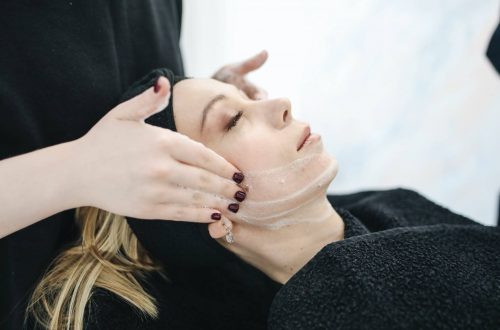Skincare for Sensitive Skin: How to Avoid Irritation and Allergic Reactions
Sensitive skin can be difficult to manage, as even the most gentle products can cause irritation and allergic reactions. However, with the right skincare routine, you can reduce your risk of experiencing these issues. Here are some tips for avoiding irritation and allergic reactions when caring for sensitive skin:

1. Avoid Harsh Ingredients
Many skincare products contain ingredients that can be harsh or irritating for sensitive skin. Some common offenders include alcohol, fragrances, and sodium lauryl sulfate. Look for products that are labeled as “gentle” or “non-irritating” and avoid those that contain any of these ingredients.
2. Use Gentle Cleansing Methods
Cleansing is an important step in any skincare routine, but it’s especially important for those with sensitive skin. Avoid using hot water, which can strip the skin of its natural oils, and opt for lukewarm water instead. Use a gentle, fragrance-free cleanser, and avoid using harsh exfoliating scrubs.
3. Moisturize Regularly
Sensitive skin is often dry, so it’s important to moisturize regularly to keep it hydrated. Look for products that are formulated for sensitive skin and contain ingredients like glycerin, hyaluronic acid, and ceramides. Avoid moisturizers that contain fragrances or other irritants.
4. Wear Sunscreen
UV rays can be especially damaging to sensitive skin, so it’s important to protect it with sunscreen. Look for a sunscreen that is labeled “gentle” or “non-irritating” and has a sun protection factor (SPF) of at least 30.
5. Be Mindful of the Environment
Certain environmental factors can also contribute to skin irritation and allergic reactions. Be mindful of things like wind, cold, and heat, and try to protect your skin from these elements when possible.
6. Avoid Using too Many Products at Once
It can be tempting to try out new skincare products, but when you have sensitive skin it’s important to be cautious. Avoid using too many products at once and introduce new products to your routine slowly. This will help you identify any products that may be causing irritation or allergic reactions.
7. Consult With a Dermatologist
If you have sensitive skin and are experiencing irritation or allergic reactions, it’s a good idea to consult with a dermatologist. They can help you identify the cause of your symptoms and develop a skin care routine that’s right for you.
By following these tips, you can reduce your risk of experiencing irritation and allergic reactions when caring for sensitive skin. Remember to be gentle and use products specifically formulated for sensitive skin, and always consult with a dermatologist if you have any concerns.
Subscribe to Newsletter






